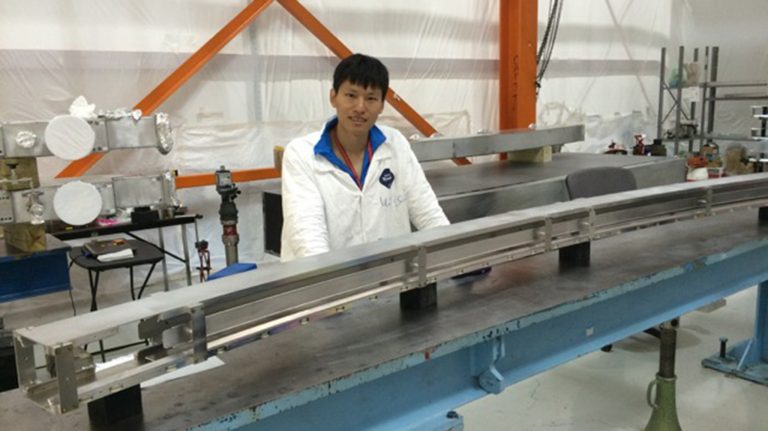Wanwei Wu headed to FermiLab to further study particle physics
OCTOBER 21, 2016 BY

UM physics graduate student Wanwei Wu conducts research in one of the departmental labs. Submitted photo
As scientists worldwide continue delving into the secrets of the universe, a University of Mississippi graduate student joins the ongoing exploration of particle physics, studying the most infinitesimally tiny pieces that comprise matter.
Wanwei Wu of China has been selected to receive a Universities Research Association Visiting Scholar Award of $25,920 for his proposal, “Beam Dynamics in the Muon g-2 Storage Ring.” The prestigious honor from the consortium that manages Fermi National Accelerator Laboratory will fund 12 months of on-site research at the facility starting Nov. 1. This award is for the reimbursement of salary and university fringe benefits.
In the three years since the university joined URA, the research group led by Breese Quinn, associate professor of physics, has received two URA Visiting Scholar awards (postdoctoral researcher Jim Kraus also received the honor in 2013) and a FermiLab Intensity Frontier Fellowship (given to Quinn, also in 2013). Several other URA members have yet to receive an award.
“Wanwei’s proposal was selected in competition with postdocs and professors from the top universities in the nation,” Quinn said. “This record for Mississippi demonstrates that we are benefiting greatly from membership in URA, and the U.S. particle physics program is benefiting from the quality researchers that Mississippi is sending to work at FermiLab.”
Wu, who applied for the fall 2016 URA Visiting Scholars Program Award in August, said he was glad when he heard his proposal was approved at the end of September.
“I am glad that the URA offered me this award,” Wu said. “I will work hard and make sure the project completed on time.”
Wu’s work is based on the FermiLab Muon g-2 Experiment, which could produce important advances in particle research, Quinn said.
“We are measuring how much the muon precesses, or wobbles, when it moves in a magnetic field,” he said. “If we find that the amount of wobble is different than what we expect, it will be a discovery that there are definitely other particles in the universe that we have never seen before.
“Wanwei’s specific work is to produce an extremely high-quality and well-understood muon beam to measure.”
A graduate of Sichuan University in Chengdu, Sichuan Province, Wu said his intrinsic love with physics leads him to keep studying and exploring the amazing secrets of nature. He came to Ole Miss because he said attending here is the best way for him to pursue such a goal.
“The courses on physics I took at UM are important and helpful to start my research,” Wu said. “The academic spirits I learned from professors at the department really encourage me and my research with belief.
“The theoretical training on particle physics I got from Dr. (Alakabha) Datta (associate professor of physics and astronomy) is extremely useful to understand the phenomena on experimental particle physics. I really appreciate all the professors, as well as graduate classmates, at the department for their help.”
Wu’s award attests to the strength of the department and the quality of its faculty, said Luca Bombelli, chair and professor of physics and astronomy.
“All three of our URA Awards demonstrate that the University of Mississippi is leading the way in finding answers to the most complex questions everyone has about the universe and its origins,” Bombelli said. “As our reputation for excellence grows, I feel confident the department’s faculty and students will continue to attract researchers who excel in their studies.”
By building some of the largest and most complex machines in the world, FermiLab scientists expand humankind’s understanding of matter, energy, space and time. The organization is at the forefront of research into neutrinos, ubiquitous but hard-to-catch particles that might point to a better understanding of the first moments after the Big Bang.
The proposed international Deep Underground Neutrino Experiment, to be based at FermiLab, will be the world’s largest experiment for neutrino science and proton decay studies.
FermiLab is also heavily involved in research at the Large Hadron Collider and serves as the U.S. headquarters for the CMS experiment there.
FermiLab scientists are at the cutting edge of research in dark matter and dark energy, which helped shape the universe and will continue to guide its evolution into the future. Fermilab is a base for exploration of the fundamental particles and forces that govern our world on the smallest scales.
For more information about the UM Department of Physics and Astronomy, visit https://physics.olemiss.edu/. For more information about Fermilab, go to http://www.fnal.gov/pub/science/particle-physics/index.html.